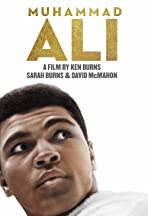Muhammad Ali was in the news most of my life even though boxing was something that I paid little attention to. The mini series put together under Ken Burns' guidance made me realize his life was more significant than most athletes. First released to PBS television it is 8 hours long, but something unexpected seems to happen in every episode.
Born and raised in Louisville, Kentucky as Cassius Clay. He did not do well in school and was thought to be dyslexic. He stumbled on a boxing club that was both free and integrated. At first not very notable, but applied himself and started leaving a mark winning a national Golden Glove award. He qualified for the American Olympic team and winning the gold medal.
My interest in the Olympics really got started with the Rome Olympics of 1960. That was when Cassius Clay won a gold medal. Afterwards he wasted little time turning professional. A group of Louisville men characterized as gangsters took control of his career. One of his models was wrestler Gorgeous George who was a self promoter and Cassius started spouting poetry and predictions. Angelo Dundee became his trainer for most of his career.
His career took off and with his sense of humor and brashness he became a fan favorite. Early on his group got the rights for closed circuit telecasts. In his fight against Doug Jones he failed to knock out fans thought Jones won, but Clay won a decision (some said it was really a business decision). His successes led to a title bout with Sonny Liston , an event my friends and I anticipated with contesting who could do the best "I am the Greatest." This was an historic night that was recently turned into a movie commemorating a meeting involving football star Jim Brown, singer Sam Cooke and Malcom X. He won the title.
As his fight career developed he also became interested in the Muslim faith. He talked to both Elijah Muhammad and Malcolm X. After winning the title he was ready to announce his commitment. There was a feud between Malcolm X and Elijah Muhammad. Cassius announced a new name with an early favorite being Clay X, but Muhammad Elijah suggested Muhammad Ali.
He married a non Muslim woman that had been chosen for him, but it ended in divorce. Altogether he married three other women, all Muslim and had seven children.
Originally he had been classified as ineligible for the military draft, however as he became famous and switched religions there was resentment and complaints. He was ruled eligible for the draft. He is televised while being physically examined and when all that was done he refused induction. During this time he not only talked with Muslim leaders, but also consulted with Martin Luther King who opposed the Vietnam War. A lot of legal efforts were made that resulted in him spending a small time in prison, Eventually his case went to the Supreme Court and his conviction was overturned. Later he was given a Medal of Honor by President George W. Bush.
He changed his management group to the Nation of Islam. Herbert Muhammad, son of Elijah became a manager and close friend to Ali. At one point Malcolm X was expelled from the Nation of Islam and Muhammad also broke his relation to Malcolm X, a decision he later regretted. Malcolm X was assassinated and there were connections to members of the Nation of Islam.
After his declaration of being Muslim he had his boxing licence stripped from some jurisdictions. Some of his future fights were determined by where he could legally fight. Still he kept defeating opponents like Floyd Patterson, Henry Cooper, George Chuvalo, George Foreman, Ken Norton, Joe Frazier Larry Holmes, Ernie Terrell. He fought in London, England; Manila, Philippines and Brazzaville in the Democratic Republic of Congo. He became a hero around the globe. Lost only 5 times while winning 56 bouts and knocked out 37 of his opponents.
A personal note: while working in the circulation department of the Etobicoke Guardian I had a minor dealing with the Chuvalo family. Being able to not be knocked down by Ali in two fights he became a hero to Canadians.
Muhammad Ali had wanted to retire many years before he did, but had financial concerns that required more fights. He had been inactive for three and half years while legal details regarding his draft rejection. Likely his boxing career led to Parkinson's. This was a very humbling experience for the boxer. A big, but very welcome surprise came when during the Opening Ceremonies of the 1996 Olympics held in Atlanta Ali took the torch and lit the flame. He had been reluctant because he knew his body would be shaking.
Ken Burns is a key person behind this series. He has a long history of dealing with important people and events in depth and comprehensively such as "The Civil War (1990), "Jazz" (2001), "Baseball" (1994 and 2010), "The Central Park Five" (2012), ""The Roosevelts: An Intimate History" (2014) and "The Vietnam War" (2017).
He was entertaining, but also generous and profound. I will remember his slogan, "Floats like a butterfly and stings like a bee." This series has been very mind opening.

No comments:
Post a Comment